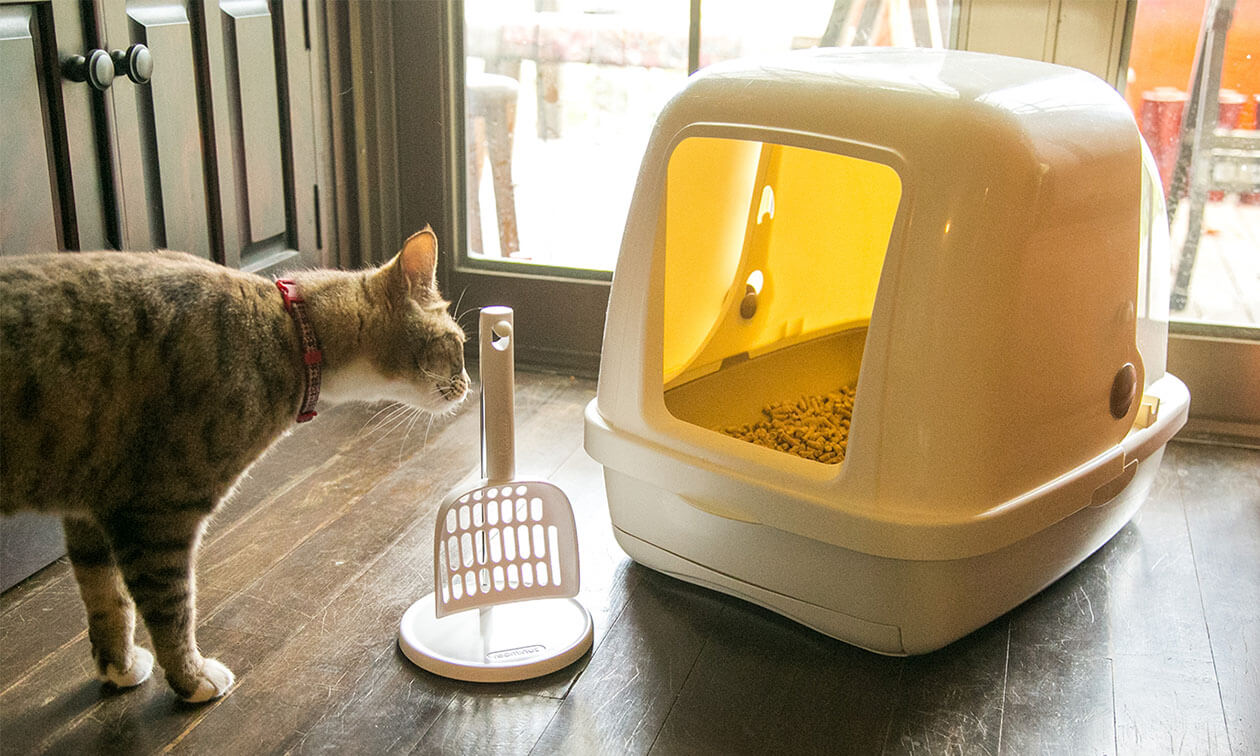Think your cat acts like “their **** don’t stink?” It does! Getting a whiff of their droppings or urine can be quite off-putting for you or visitors to your home. Even though your cat is the one who made the stink in the first place, too much of it can turn them off from using the litter box. Controlling litter box odor is vital — your nose (and your cat) will thank you! Your cat can even stop using the litter box if it smells too much.
Clean the Litter Box Once (If Not Twice) Per Day
The most important part of litter box maintenance is scooping. Scooping the pee and poop regularly means less odor can build up, and your cat will find their box appealing to use. Clean the litter box at least once per day, but ideally twice. Be mindful of what you use to clean the box. Cats are sensitive to changes in their litterbox smell and if you use a new and strong-smelling cleaner, they could not want to use it. For convenience and less waste, use a large litter disposal system or a baby diaper disposal bin so you don’t have to run your cat’s waste out to the garbage every time you scoop. You just scoop and deposit the waste into the bin, pull a lever, or close a flap (depending on the style), and the waste is contained. Once a week, you bag up the waste you’ve collected, take it out to the trash, and start fresh.
Use a Correctly Sized Litter Box
A big part of keeping a litter box from smelling is ensuring your cat is comfortable using it and has enough space to bury their waste. Cats can be quite particular about their bathrooms. If the litter box is too small or in a busy location, your cat may avoid it altogether or jump out before covering up their deposit. You will need to be very mindful of litterbox location to make sure your cat uses the box and does not go outside the box.
The litter box should be at least as long and wide as your cat, from the tip of their nose to the tip of their extended tail. Your cat should be able to easily do their “doody” and then have space to move around and bury it without stepping out of the box.
If your cat uses a covered litter box, you can investigate litter box covers that include a charcoal filter to help reduce odors. Keep in mind that most cats prefer an uncovered box and if you’re thinking that cover will help your home by keeping the smell contained, you may be disappointed. Be careful if switching the type of box for your cat. Keeping the smell in means a much less pleasant experience for your cat so open boxes are recommended. They may choose less smelly places outside the box to eliminate.
Another important thing to consider with litter boxes is the number of litter boxes. If you want to make sure your cat uses the box, and a good way to keep the boxes cleaner, is to have one more litter box than the number of cats in the house. So, if you have two cats, ideally you would have three litter boxes.
Use the Right Kitty Litter
Since keeping the litter box clean is the main way of preventing odor, you’ll want a type of cat litter that makes clean-up quick and easy. Choose an absorbent clumping litter with low dust so the particles (and the smell) don’t travel throughout your home.
While it might seem like a good idea, don’t use scented litter to try and mask bad odors. Cats are extremely sensitive to smells, and while we may think it smells nice, it can be very irritating to your cat’s respiratory system. This can make your cat avoid the litter box, meaning some surprises throughout your home. Instead, sprinkle a small amount of baking soda on the bottom of the litter box before refilling it with regular litter to help absorb odor without adding irritants that affect your cat’s nose or lungs.
Thoroughly Wash the Litter Box Regularly and Replace the Box Every Year
To further reduce litter box odor, scrub and wash your cat’s litter boxes at least once a month. Empty the litter box and then clean it with soap and hot water. Don’t use chemicals like bleach for these cleanings, as the smell can discourage your cat from using the litter box afterward. Let the box air dry and fill it with fresh litter.
With continued use, a plastic litter box will get scratched, and these scratches in the material are a great place for bacteria to reside and odor to build up. If you’re using plastic, replace your cat’s litter box once per year to reduce the smell.
Place the Litter Box in a Well-Ventilated Area
It’s understandable to want to tuck a cat’s litter box away in a closet or other small, confined area. You want to avoid looking at (and smelling) it. But you’ll want to ensure that you’re not inadvertently concentrating all that smell in one place. Your best bet is a well-ventilated area that allows the odor to dissipate Open areas are much more appealing to cats who don’t want to feel trapped while doing their business.
Changes in your cat’s litter box usage, amount or smell can mean your cat is having a medical problem. If you notice any of these changes, be sure to speak with your veterinarian.
All-in-all, your best defense against litter box odor is to just get in the habit of scooping every morning and every evening as part of your daily routine. It takes just a few seconds and can save you and your cat a lot of unnecessary stress and stink.
ZPC-02522



